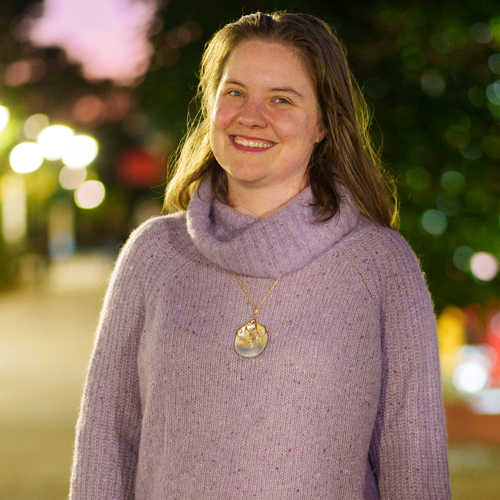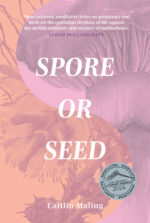Poet Caitlin Maling on how to snatch small moments of time for writing

I’ve long been a fan of a series of articles called ‘How I Get It Done’, where impressive people with seemingly unlimited abilities (and resources) detail how they go about their day-to-day lives. Often this involves waking up at times that, until I had a baby, I thought were hypothetical numbers, pure maths proofs. Since I had my baby, more than ever, I’ve been asked, and asked myself, questions about ‘how I get it done’, where ‘it’ is specifically ‘writing’.
The thing I quickly learned about life with a child, is that all existing routines are quickly obliterated by new ones, and these new ones only last as long as the next developmental milestone or daycare illness. But I present to you, in general terms, the process by which I wrote Spore or Seed, my poetry book of pregnancy and early motherhood.
The initial stages of the manuscript began in normalcy, which for me involves writing first thing after getting out of bed, over coffee, at my local café. Except that, for two out of the first three months of my pregnancy, I was teaching creative writing in prisons. This meant that very early drafts from Spore or Seed were composed in the education units of custodial facilities during the time when my students were completing their own writing exercises. As any pregnant woman will tell you, often in the first trimester you feel sick (understatement), but to use the restroom in the prisons I had to be accompanied by an officer who would escort me to and from the facilities. Two of the prisons I was teaching in were male-only. In the induction video from the 1990s, they specifically warn you against allowing the prisoners to learn anything personal about you, particularly anything that is a ‘weakness’. Many of the early poems I wrote at this time were exploring ideas of strength/weakness in the pregnant body, as well as privacy – what we can see and what remains hidden.
Then, after I finished teaching in the prisons, I returned to my regular job, casual university teaching. There was a month where I was able to write my poems as usual in the mornings at the café, and then it was April 2020. Because my normal process involves writing surrounded by the noise of other people’s conversations, my poems are usually populated by overheard voices, snippets of dialogue. The poems of pregnancy from 2020 are much quieter. Many of them are just my husband and I, including the central sequence ‘From Tumbleweed to Tick’, which I largely wrote from Grey Shack Settlement when the regional borders were open. The weather was so hot at times that we had to put our phones and laptops in the fridge because they kept shutting down; luckily, I compose by pen and paper.
At that time, to qualify for the Centrelink maternity leave (the only paid maternity leave for which I was eligible), I needed to work a minimum number of hours per week and not have a gap of employment longer than a few months. To absolutely ensure I would be eligible, I accepted online teaching for the university and was still grading up until the day I went into labour. When I went to the hospital, I took my writing notebook and tried to write through contractions. One of the sections of the long poem ‘Crowning’ is actually taken from one of these in labour drafts and bears the sense of the fracturing I was encountering.
Home with my son, I soon learned that breastfeeding is one of the greatest time-sucks (hah!) you will ever encounter and one of the few things I couldn’t write while doing. I could, however, read, but soon decided to just read light books, such as volumes of poetry, after I accidentally dropped a weighty hardback near my baby’s head. Once he was older, I shifted to the trick of audiobooks in the earbuds. I also listened to audiobooks when I woke at 1.30 am to pump – as in breast-milk-pump – which resulted in one of my favourite poems in the volume, aptly titled ‘I Write Poems When I Wake at 1.30am to Pump’.
Prior to having my son, to Covid shutting the coffee shops, or to working in the prisons, when I would write poems at my café, the experience was like stretching, like my own yoga practice occurring at my own pace. After my son was born, my coffee mornings shrunk to twenty to thirty minutes when my mother-in-law would come and hold him between feeds. I often had to choose between showering or writing (I would nearly always pick writing). These poems felt flinty, like picking up the first stone to hand and throwing it at the page. There are quite a few shorter poems, or poems with short lines, in Spore or Seed, and I think this is the reason.
In order to complete this manuscript, I was thankful to receive small grants from the Australia Council and DLGSC (WA), which funded writing time. The other key reason this manuscript exists is that my husband was able to take part-time parental leave for the majority of our son’s first year. Although I went back to teaching at the university when my son was six months old (pumping with my hands-free kit while driving to and from work), this still left me time, snatched between breastfeeds and naps, to transform the poems from individual stones into something larger. This process was completed over editorial zoom meetings with the inestimable Tracy Ryan throughout my son’s second year of life, after he had weaned and begun to walk, talk and demand blueberries. I hope it’s a book which other people might find time for, snatch time back away from whatever other duties weigh upon them. I always say the best thing about poems is that they are short.



